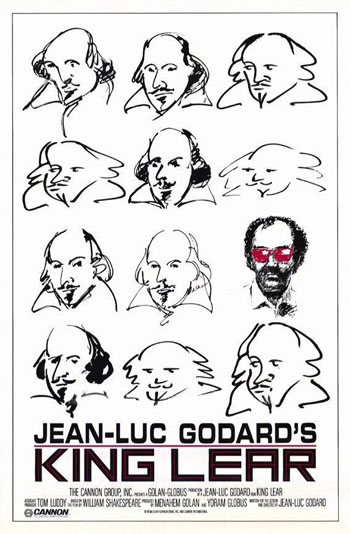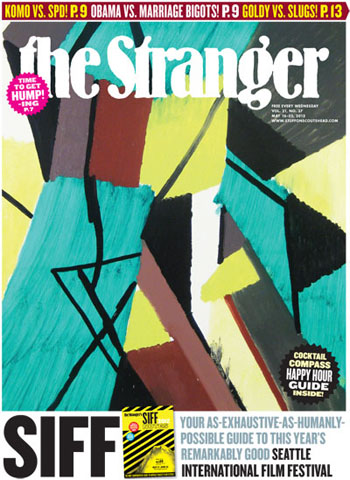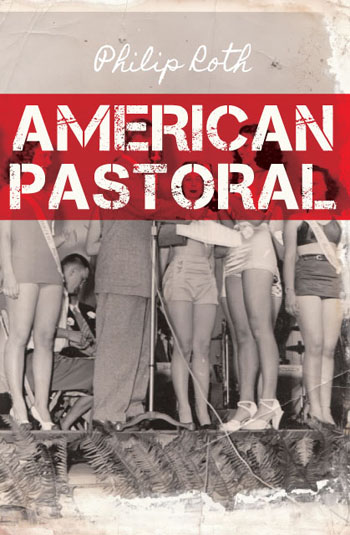There’s a nifty documentary short making the rounds at the moment, “A History of John Baldessari,” by Henry Joost and Ariel Schulman. It’s narrated by Tom Waits, who notes that “Baldessari once said that the most important artist of the 1960s was not Andy Warhol or Jasper Johns but the director Jean-Luc Godard.” Cut to Baldessari, who comments, “I probably did say it.” A day that goes by without mention of Godard is an unusual day indeed, but these past couple of days have seen the name pop up all over. The New Yorker‘s Richard Brody has posted the list of his top ten films of all time which he’s sent in to Sight & Sound as his ballot in the magazine’s once-a-decade poll. At the top of Brody’s list is Godard’s King Lear (1987).
And just yesterday, Jonathan Rosenbaum posted a review he wrote for the Voice in 2008: “Perhaps the most impressive thing about Brody’s Everything Is Cinema: The Working Life of Jean-Luc Godard is that it’s 700 large-format pages long, yet winds up seeming too short—a tribute to both the author and his 77-year-old subject.” Of course, Godard is now 81 and, as we established the other day, it’s going to be a while before we see his followup to Film socialisme.
E-flux journal #35 is just out, and it features the second part of Irmgard Emmelhainz‘s in-depth study, “Between Objective Engagement and Engaged Cinema: Jean-Luc Godard’s ‘Militant Filmmaking,'” focusing in particular on Here and Elsewhere (1970-74), “a film about utterances and visibilities gliding into one another in relation to cinematic voice, speech, discourse, expression, and their becoming-information, challenging the dominant forms of the shared sensible.”
At This Recording, Alex Carnevale considers “Andre Bazin’s seemingly innocent 1971 appreciation of his favorite filmmaker, Jean Renoir.”
“There is a category of writing that is valuable to film culture but is unfortunately ephemeral: I’m speaking of program notes, written to accompany screenings and retrospectives.” Girish Shambu: “The early, formative days of my cinephilia were fueled in no small part by the essays and capsule reviews penned by James Quandt at the Cinematheque in Toronto.” And Girish gives us a few beautiful excerpts from Quandt’s notes.
DVD/Blu-ray. Back to Richard Brody, who notes that, while he’s eagerly anticipating the release of the full three-hour-and-six-minute director’s cut of Kenneth Lonergan’s Margaret on July 10, he’ll be glad to have the the two-and-a-half-hour version that slipped in and out of theaters all too quickly and quietly last fall as well: “Every version has its delights and its significance.”
Criterion’s running an instant classic interview with Spike Jonze conducted by one Perkus Tooth. The occasion, of course, is the new release of Being John Malkovich on DVD and Blu-ray.
At Cinespect, Rebecca A. Brown explains at considerable length why World on a Wire (1973) makes the top five on her list of favorite films by Rainer Werner Fassbinder. Related: This past weekend, we noted the passing of Günther Kaufmann at the age of 64. The Guardian‘s running Ronald Bergan‘s obituary, in which he notes that Kaufmann and Fassbinder “first met in the autumn of 1969 on the set of Volker Schlöndorff‘s television film of Baal, Bertolt Brecht’s expressionist play. Fassbinder played the title role of a celebrated anarchic poet, while the 22-year-old Kaufmann, who had previously worked at sea, had a bit part. Fassbinder fell for Kaufmann immediately and cast him in his third feature, Gods of the Plague (1970). Kurt Raab, the production designer and former lover of Fassbinder, recalled: ‘We were all attracted to Günther’s beautiful body, his radiant sensuality and his mild manner, which could suddenly turn brutal if he felt offended. Everyone fancied this guy and openly showed it.'”
New York. Kaufmann doesn’t appear in World on a Wire, but Werner Schroeter does. With MoMA‘s retrospective on through June 11, Ulrike Sieglohr argues in Film Comment that Schroeter “was one of the New German Cinema’s seminal figures, if far more marginal in terms of recognition.”
Seattle. David Schmader introduces a big fat guide: “You know how some years of the Seattle International Film Festival are better than others? In all seriousness, holy crap! This is the best SIFF since The Stranger can remember, and the entire staff watched previews until our eyes bled to find that out. You’re going to find a ton to love.” The festival opens today and runs through June 10.
Los Angeles. Doug Cummings has revived Film Journey, which is extraordinarily welcome news. His first entry in over a year now concerns James Whale’s Show Boat (1936), screening on Saturday as part of the UCLA Film & Television Archive series Universal Pictures: Celebrating 100 Years.
“Rebel is an interrogative ode to Nicholas Ray’s masterpiece Rebel Without A Cause (1955), conceived by [James] Franco to embrace and mine the main themes and events in the original film. The exhibition reinterprets the film’s legends, the people involved, its place in Hollywood, film as a medium, and behind-the-scenes footage, in a new, fresh, and unconventional presentation of film, video installation, photography, painting, drawing, and sculpture, housed in and framed by iconic, Hollywood structures.” At the Museum of Contemporary Art through June 23.
The Los Angeles Film Festival‘s announced that William Friedkin will serve as its Guest Director for this year’s edition, running June 14 through 24. Artists in Residence will be Danny Elfman, Michael Voltaggio and Raphael Saadiq. “Conversations at the Festival will include a session with Breaking Bad stars Bryan Cranston, Aaron Paul, Anna Gunn and series creator Vince Gilligan, as well as screening of the premiere episode of Aaron Sorkin’s long anticipated HBO series The Newsroom, followed by a conversation with Sorkin, executive producer Alan Poul and director Greg Mottola. A spotlight will be shone on Women of Wonder: a series of panels celebrating women in the animation field.”
The Sun Sets in the West: Mid-Century California Noir opens tomorrow at LACMA and runs through May 26, and Michael Atkinson‘s got an overview in the Weekly. Tomorrow sees an Alternative Projections Marathon at the Echo Park Film Center.
San Francisco. “Cinematheque artistic director Steve Polta balances familiar names with lesser known for the third annual Crossroads festival at the Victoria Theater,” writes Max Goldberg in the Bay Guardian, “though Ken Jacobs’s Occupy-strength Seeking the Monkey King (2011) promises to unseat the image of a mellowing old master. The festival’s only solo program, besides a tribute to Canyon Cinema co-founder Chick Strand (her 1979 film Soft Fiction is rarely screened and highly recommended), belongs to Laida Lertxundi. A former CalArts student with a sure handle on 16mm as a philosophical instrument, Lertxundi was recently featured in the Whitney Biennial. Where Strand made some of her most beautiful work far from Southern California, Bilbao-born Lertxundi brings an outsider’s eye and sharply turned cadence to the shifting landscape of Los Angeles: one has the sense of desert reclaiming city watching her short films.” Mike Everleth has the lineup; Crossroads runs from tomorrow through Sunday.
In the works. Fisher Stevens, currently directing Stand Up Guys with Al Pacino, Christopher Walken and Alan Arkin, is planning an adaptation of Philip Roth’s Pulitzer Prize-winning novel, American Pastoral, reports TheWrap‘s Brent Lang. That proposal for a cover design, by the way, is by Jenny Volvovski.
“The Russian government is underwriting a biopic of the late-19th/early 20th-century ballerina and tsarist ‘femme fatale’ Mathilde Kschessinska, and its cultural ministers have enlisted Paul Schrader to write the screenplay for ‘an internationally acclaimed director to be announced soon.'” Movieline‘s S.T. VanAirsdale has the press release and adds, “if it sounds unprecedented, that’s because it is.”
Wim Wenders, Michael Glawogger and Victor Kossakovsky are among ten directors who’ll each be directing one segment of Cathedrals of Culture, a 3D series for the French-German television broadcaster Arte, reports Variety‘s Nick Vivarelli.
At the Playlist, Drew Taylor reports that Tom Tykwer and Andy and Lana Wachowski’s Cloud Atlas, their adaptation of David Mitchell’s ambitious novel, will likely run two hours and 44 minutes and will open in the US on December 6.
Viewing. The fourth issue of The Seventh Art, a video magazine, features a longish interview with Peter Bogdanovich, a video essay on David Fincher’s The Girl with the Dragon Tattoo and more.
Obit. “Donna Summer lived with a lot of contradictions in her life,” writes Steven Hyden at the AV Club. “She was a disco queen raised on rock, a religious woman who became the reigning sex symbol of late ’70s pop, a dominant singles artist who specialized in expansive concept records, a singer who epitomized mainstream music in her time and ended up influencing the underground for the next few decades. That life has come to an end, as has Summer’s battle with breast cancer. Summer died Thursday at her home in Key West, Fla. She was 63.”
Update. It’s Day Five of For the Love of Film: The Film Preservation Blogathon, and Farran Nehme, having hosted for two days and posted her own contribution, an entry on Hitchcock’s Lifeboat (1944), has passed the torch on to the capable hands of Rod Heath.
For news and tips throughout the day every day, follow @KeyframeDaily on Twitter and/or the RSS feed.






